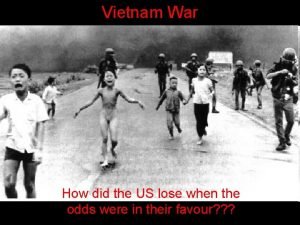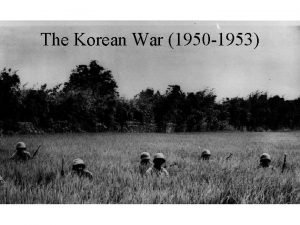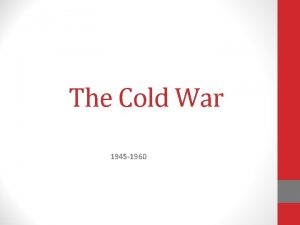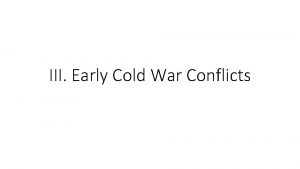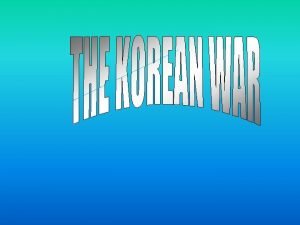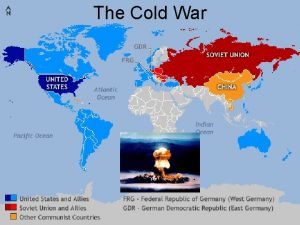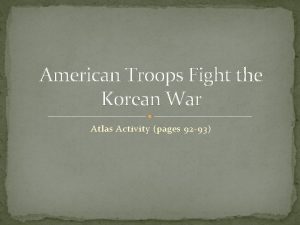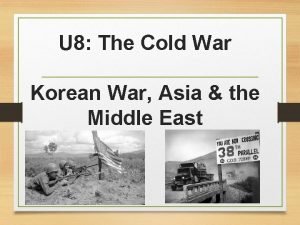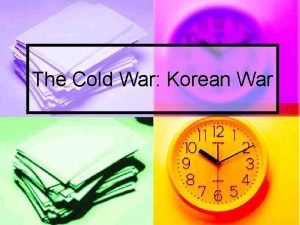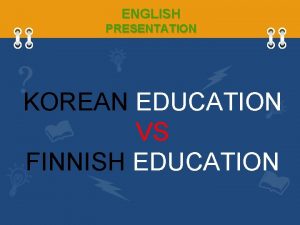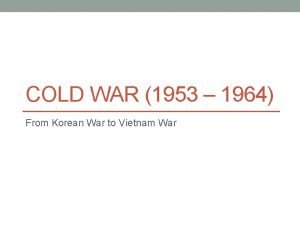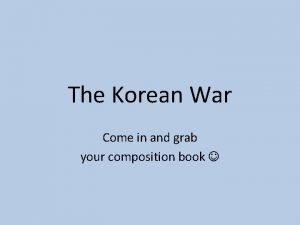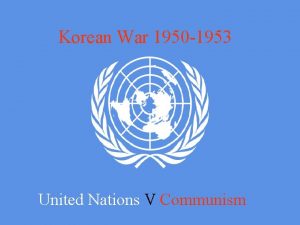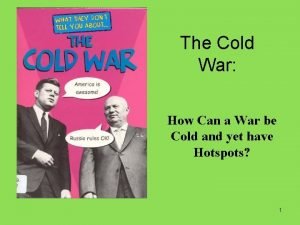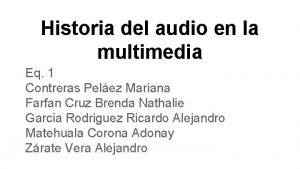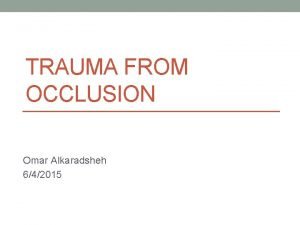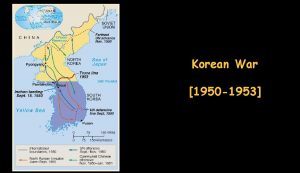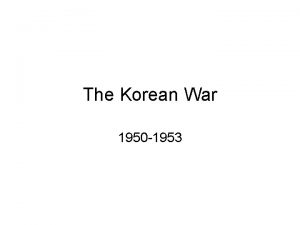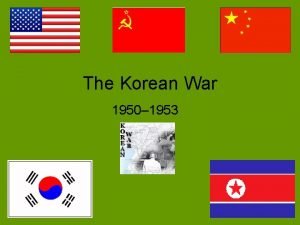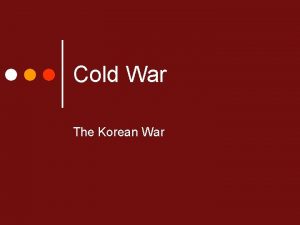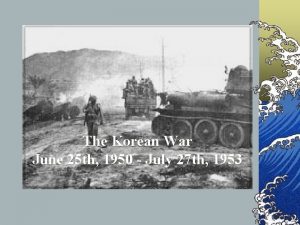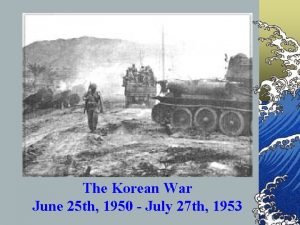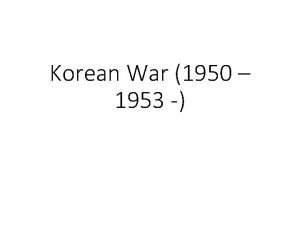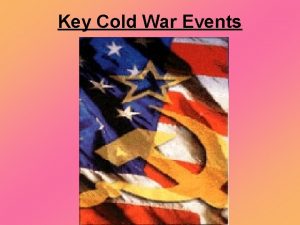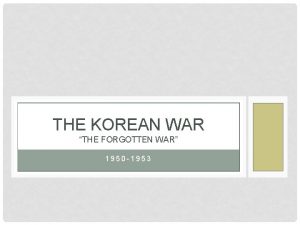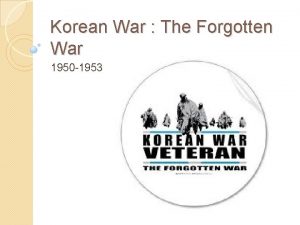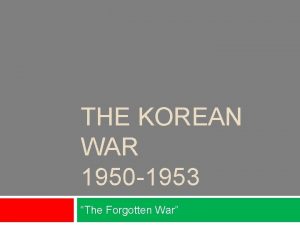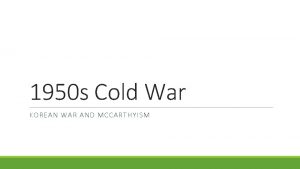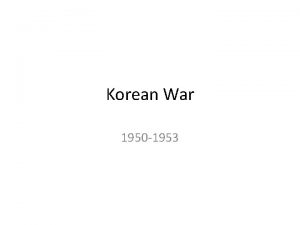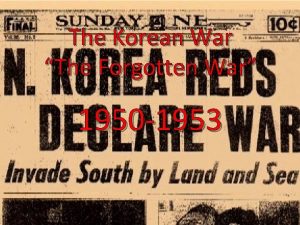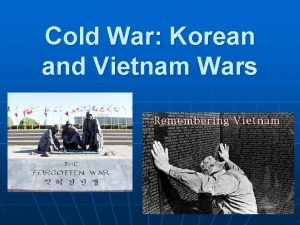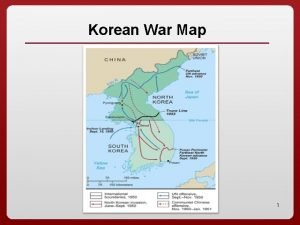Korean War Korean War 1950 53 On June




















- Slides: 20

Korean War

Korean War (1950 -53) • On June 25, 1950 the forces of North Korea crossed the 38 th Parallel into the Republic of Korea, attacking at many points. The size of the assault made it clear that this was a full-scale invasion. • World reaction was quick. At the request of the United States, the Security Council of the United Nations met on the afternoon of June 25 and called for an immediate stop to the fighting and for the withdrawal of North Korean forces to the 38 th Parallel. • The North Koreans had no intention to leave so President Truman ordered the United States Navy and Air Force to support the South Koreans by every possible means. • On the same day, a second UN resolution called on the Members to "furnish such assistance to the Republic of Korea as may be necessary to repel the armed attack and to restore international peace and security in the area". • This was, in effect, a declaration of war on North Korea.

Canada and the Korean War • The Canadian Government, while agreeing with the UN moves made to halt aggression, did not immediately commit its forces to action in Korea. • At the close of WWII, the Canadian armed forces had been reduced to peacetime strength and were specially trained for the defence of Canada. • The Far East had never been an area in which Canada had any special national interest. But Canada sent troops.

• Altogether 26, 791 Canadians served in the Korean war and another 7, 000 served in theatre between the cease-fire and the end of 1955. • United Nations forces (including South Korean) fatal and nonfatal battle casualties numbered about 490, 000. Of these 1, 558 were Canadian. • The names of 516 Canadian war dead are inscribed in the Korea Book of Remembrance. • The truce, which followed the armistice of July 27, 1953, was an uneasy truce, and heightened the Cold War tensions. • Yet, for the first time in history an international organization had intervened effectively with a multi-power force to stop aggression and the UN emerged from the crisis with good reputation.


Suez Crisis (1956) • Britain, France and Israel attacked Egypt in 1956, as Egypt had taken over the French/British owned Suez Canal. • The Suez Canal links the Mediterranean and Red Seas. • The Soviet Union supported Egypt, and threatened to use nuclear weapons. • Lester Pearson, President of the UN General Assembly, proposed sending in UN peace keepers to keep peace.


Pearson won the Nobel Peace Prize in 1957 for his role in resolving the Suez Crisis. He was Prime Minister from 1963 – 1968 (Liberal Party).

Cuban Missile Crisis (1962) Soviet President Khrushchev and American President Kennedy



• The Cuban Missile Crisis began 22 October 1962. Following spy plane pictures that showed the USSR was installing ballistic missiles in Cuba capable of hitting US and Canadian targets, President John Kennedy (JFK) announced an American naval blockade of the island, threatening further action if preparation of the sites continued. • • John Diefenbaker’s government was only informed of Kennedy's intentions only 1. 5 hours in advance. • Canada's hesitated to respond, in part due to the desire of the prime minister and others to preserve the independence of Canadian foreign policy and to maintain a balanced posture in crisis conditions. • JFK and Diefenbaker’s relationship grew worse.


This map of the Cuban Missile Crisis shows the range of Soviet SS-4 medium-range ballistic missiles and SS-5 intermediate-range ballistic missiles if launched from Cuba .

• Soviet ships filled with nuclear missiles were coming towards the American blockade of Cuba, and the world got ready for a nuclear war • The crisis itself ended October 27 -28 when Soviet Premier Nikita Khrushchev agreed to dismantle and remove the USSR missiles in Cuba. • The Americans agreed not to invade Cuba and to remove nuclear missiles from Turkey

Vietnam War

Vietnam War • North Vietnam (and other Communist countries) against South Vietnam (and the United States) in the 1960’s and 1970’s. • Canada did not send troops to the Vietnam War. • The United States had conscription (military draft) and many people who refused to fight (draft dodgers) escaped to Canada, where they would live the rest of their lives. (up to 60, 000 people)

• On April 2, 1965 Lester Pearson gave a speech at Temple University in the United States, where he called for a stop to the United States bombing in North Vietnam. • When the American President LBJ (Lyndon B. Johnson) heard this the next day, he met with Pearson and grabbed the much smaller Canadian leader by his jacket and talked angrily with him for an hour.

• After the fall of South Vietnam in 1975, thousands of refugees, called boat people, fled Vietnam for both political and economic reasons. • Canada agreed to accept many of them, in one of the largest single influxes of immigrants in Canadian history. This created a substantial Vietnamese community in Canada, concentrated especially in Vancouver, Montreal and Toronto

Boxing champion Muhammad Ali refused to join the draft and was sentenced to 5 years in jail
 Vietnam war
Vietnam war Truman vs eisenhower venn diagram
Truman vs eisenhower venn diagram Korean war map
Korean war map Causes and effects of the cold war
Causes and effects of the cold war Korean war
Korean war What was the cause of korean war
What was the cause of korean war Cause of korean war
Cause of korean war Korea bay map
Korea bay map American troops fight the korean war 48a answer key
American troops fight the korean war 48a answer key Korean war webquest
Korean war webquest Rollback cold war
Rollback cold war Finnish korean war
Finnish korean war The korean war
The korean war What were the causes of the korean war
What were the causes of the korean war Korean war
Korean war Causes of korean war
Causes of korean war Cause of korean war
Cause of korean war 1950-1927
1950-1927 Rumusan pancasila
Rumusan pancasila Trauma from occlusion
Trauma from occlusion Di cavalcanti mulata com pássaro
Di cavalcanti mulata com pássaro
